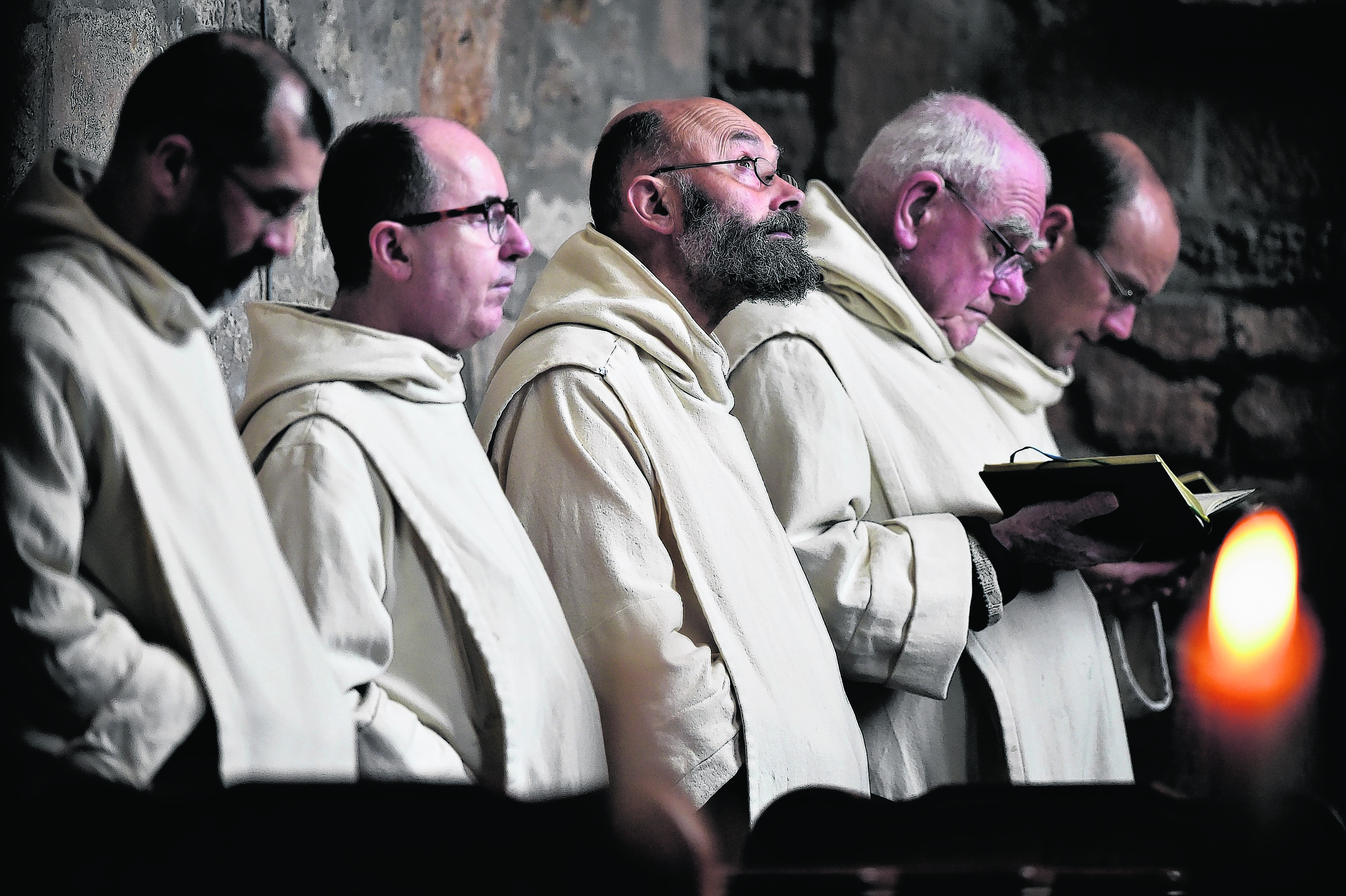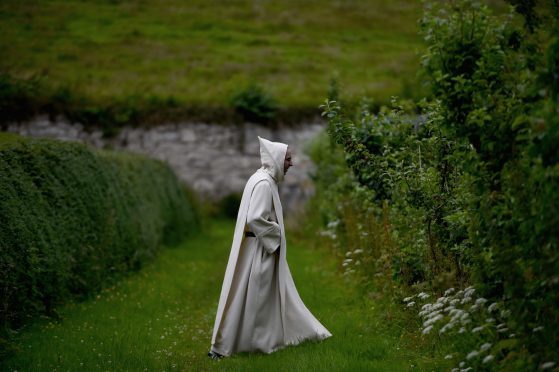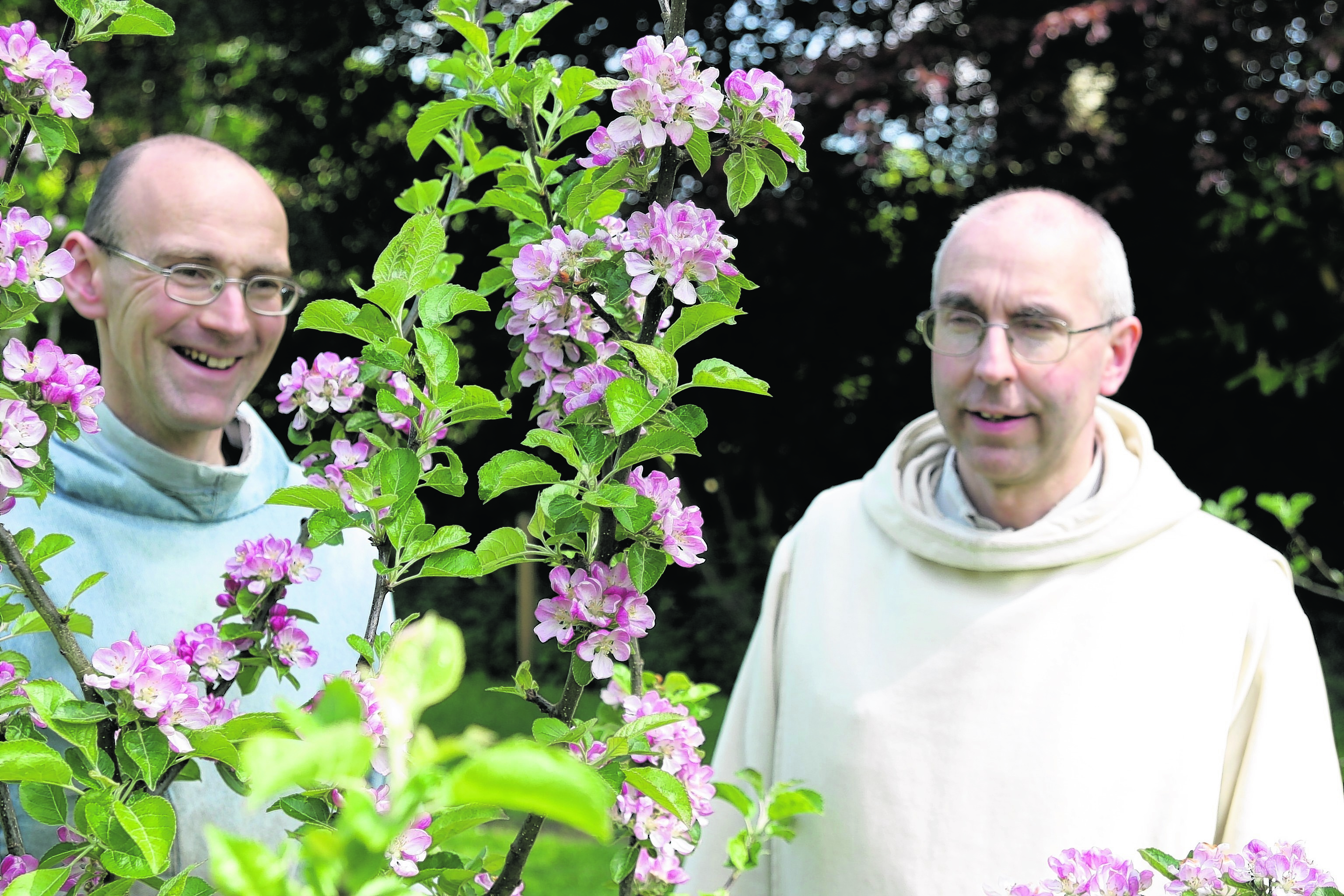Every day for the past 35 years, Brother Michael has been roused from sleep at 4.15am, before taking part in the first of eight services at Pluscarden Abbey near Elgin.
He chose to dedicate his life to the Rule of St Benedict when he was just 21 years old and fresh out of university, and has lived at the abbey ever since. He rarely leaves the tranquil grounds, and his days run to a strict timetable of prayer, reading and manual work.
Brother Michael is one of only 18 monks who live at Pluscarden.
The Mediaeval monastery dates back to 1230, when Valliscaulian monks arrived from Abbaye du Val-des-Choux in Burgundy. It is the only monastery in Britain still being used for its original purpose, and welcomes hundreds of visitors every year alongside people of all faiths who stay on increasingly popular retreats.

The spine-tingling sound of Gregorian chanting can be heard across the fields alongside the dawn chorus, and Brother Michael believes the chanting of psalms helps to keep everyone awake for the first service of the day.
Traditional and far removed from the pressures of modern life, Pluscarden is preparing for ground-breaking changes, and the monks are tentatively stepping forward into the limelight.
Although it is fundamental that their way of life is not encroached upon, people are set to know more about the order than ever before as part of a bid to complete the abbey’s restoration.
Roughly £10million is needed to embark on the work, which will see women living on site for the first time in the abbey’s history. The project will include a retreat, library, visitor centre and refectory, and the first fundraising event will see dozens of people embark on a pilgrimage from Burgundy to Pluscarden.
The 1230 Pilgrimage will cover 1,230 miles and the monks are calling on people from all walks of life to take part in each 100-mile leg.
Brother Michael is hopeful that the pilgrimage will enable people to experience something similar to a monk’s way of life.
Brother Michael
With a kind face and welcoming smile, he appears incredibly contented, and does not regret leaving his previous life in Surrey behind. On his own admission, very few people last the course at Pluscarden and it takes roughly five years to become a monk – the same time-frame required to gain an initial degree in medicine.
It is not just a question of taking the three vows of Obedience, Stability and Conversion of life. Monks must also fit in with the community. There is also a strict criteria before monks even begin their studies at Pluscarden.
They must be Roman Catholic, free from binding obligations to family, and able to demonstrate they have lived a good moral life for a number of years, which also means being free from debt.
For Brother Michael, his calling to Pluscarden came quite suddenly when he was still a student, although he refrained from saying which university he attended.
“It was only really during my last year of university that I developed a passion for the monastic way of life. Prior to that I don’t think it was something I considered,” said Brother Michael.
“I remember telling my parents that this was what I wanted to do and I think they had a few doubts, although they didn’t tell me not to go ahead.
“They got married when they were 23 years old and spent 65 happy years together. My life choice is very different but they’re actually buried here at the abbey. They were allowed to visit once or twice a year. They used to love to come and stay for a few weeks over the summertime. I think they trusted me to make the right decision. I wrote to the abbot and asked if I could join before I had even see Pluscarden.
“He told me I should come for a visit before making any decisions and it was exactly how I imagined it to be. This is a contemplative way of life, but we rarely have spare time as our days are structured and divided between prayer, private reading and manual work.
“I joined in 1982 and made my final vows in 1987. I started as a novice and was free to leave at any time during the first year.
“The majority of people leave during that time. If you’re still here after three years the chances are you will take your vows for life. Prior to that, some people find that this simply isn’t the life for them and they fade out in the first year.”
Striding round the gardens in traditional robes, Brother Michael is clearly at one with his surroundings and he will stay at Pluscarden for the rest of his life. He believes the struggles faced by monks are not so very different from those living on the outside.
“We are all people and we all have the same fears and worries. Although the monastery is somewhat removed from modern life, I think it is possible to have a foot in both worlds,” he said.
There is no TV or radio (only newspapers) in the monastery, but the monks have not been able to avoid the march of technology. All bills are paid online and some members of the community own smart phones, and are aware of the rise of social media.
“People often ask us to pray for them and I believe God sometimes wants us to ask for what we want – we can’t just expect him to know,” said Brother Michael.
“Prayer is often a means of finding your way through an impossible situation, and we’re very much aware of what people are facing today.
“I’m always impressed by the students who come on retreat, they seem terribly focused on their studies whereas I can remember university days being as much about frivolous pursuits as the studying.
“As the years have gone by, I would say the one thing I have noticed is that people don’t seem to stick at things any more. It seems the done thing to not really know what you want to do and maybe try several different careers.
“I suppose that concept is strange to me because I knew this way of life was my vocation, it wasn’t a question of sampling different things.”
Although Brother Michael is steadfast in his dedication, he is the first to admit that monastery life does not come without its drawbacks. Monks forego everything, meaning they only own the clothes they stand up in.
All funding for necessary things such as dentist check-ups are paid for from a portfolio of investment, as many people either donate or leave money towards Pluscarden abbey in their will. This pot of funding also covers food and clothing.
Each monk has his own room but all meal times are taken together and in silence, while one brother reads aloud. Brother Michael believes this is a fun experience, but admitted that many people have struggled with living alongside others day in, day out.
“You can see that it drives some people mad being here all the time and it simply isn’t the life for them,” he said.
“We are permitted to leave for things like the dentist, of course, and I recently attended the 80th birthday party of my oldest relative.
“We don’t attend things such as weddings, though, because of all the nonsense that comes with them.”
The perks of technology enable the monks to order their food shopping online, although most of the fruit and vegetables is grown on site.
“We have a rota for food shopping and go into town once a week for supplies. We all eat the same unless there’s a specific dietary requirement and we don’t have our own private stash of snacks,” said Brother Michael.
“When you make your vows for life it’s not just a question of your own inclination and dedication – it’s whether you fit in with the community.
“When you’re living alongside other people you can’t be keen on personal space and nor can you avoid people because you find them annoying. There are difficult moments and inevitable conflicts, people come and go but there have been some very strong characters over the years.
“A major part of this life is surrendering your own agenda, you have to give yourself up.”
David Broadfoot
David Broadfoot, MBE, has given himself entirely to the abbey’s cause, although he’s not even a practising Catholic.
A former Lieutenant Colonel in the Gordon Highlander regiment, he has struck up an extraordinary friendship with Brother Michael and his fellow monks, having come up with the idea of a pilgrimage.
David spent 32 years travelling the world with his regiment before running Cawdor Castle, followed by Glamis Castle. He was then asked if he would consider running the fundraising campaign for Pluscarden, and now works seven days a week on the project.
Passionate, determined and incredibly dedicated, he has come to believe in the abbey’s cause and experienced a pilgrimage of his own.
“I was originally given a figure of around three-and-a-half million back in 2015. Pluscarden has become a very personal quest for me,” he said.
“The monks are fabulous people and it’s important to remember that they’ve all led other lives. There’s an engineer, an army officer and a barman from Glasgow – and over time we’ve built up a mutual trust.
“The pilgrimage is our flagship event, but the focus isn’t so much on raising money, it’s our way of raising awareness.
“I felt very strongly that we shouldn’t just sit up and beg for money, we’ve got off our backsides and we’re now preparing to do something really special.
“We should go out and feel some pain rather than just asking for money, and the pilgrimage is a physical and spiritual challenge.
“I was originally worried about this concept of fundraising for the abbey in case people felt it didn’t relate to them, when in fact the role of the abbey is more relevant than ever.
“People come to Pluscarden on retreats from all walks of life, whether they need a break from the rat race or they’re an alcoholic who has reached rock bottom.
“You’re not a patient here but Pluscarden is very much needed if you consider the pressures of modern life.
“The monks may seem removed from society but they are incredibly intelligent people who have led a previous life and understand the world.”
The pilgrimage will start on June 5 and involves 12 legs of roughly 100 miles, and a final leg of 80 miles.
Each section will be covered by a different group of pilgrims and it is hoped a new pilgrim’s route may be established. Patrons include HRH Princess Michael of Kent.
The organisation of the event has enabled David to confront his own demons.
“I think for a time after leaving the army I was very lost because the army was my entire life. I eventually sought counselling and feel like Pluscarden has become my own personal pilgrimage,” he said.
“I was privately educated and enjoyed a very fulfilling career and family life, and I think this is partly my way of giving back.
“My wife and I lost one of our children at only 18 months, which was incredibly difficult, of course, but outside of that we haven’t experienced any major difficulties. Taking on this project has kept me busy and given me a chance to mull over things in my own head.
“So many people experience depression and anxiety these days, both myself and my colleagues felt this void when we left the army because we were suddenly thrust into a very different world.
“I’ve met some extraordinary people, including Jai Lama, an ex Gurkha officer who has just flown in from Kathmandu. He’ll be helping me on the ground. There’s still a lot to do but we’ll get there.
“Perhaps the most important thing is that this is a pilgrimage for all faiths or no faith – it should be an extraordinary journey.”
Becoming a monk
Monks will undertake spiritual readings for at least three hours a day, and must be able to participate in Latin mass.
A trial period of a month is usually set up for novice monks, before they undertake a further six months which is known as postulancy.
This is followed by a two-year noviciate, which begins with the rite of monastic initiation during which the novice is given a new name and the tonsure.
The noviciate is a period of formation in the monastic life, with classes in the life of prayer, the Holy Rule, Monastic Tradition, the Psalms, Latin and Gregorian Chant, as well as participation in the work of the community.
During it, the novice is free to leave at any time and may also be asked to leave. After the end of the noviciate, there is a vote of the community to allow the novice to take temporary vows and receive the white habit.
These vows last for a minimum of three years during which time the junior monk receives further formation in Scripture, Catholic Theology and Liturgy.
After another vote of the community, he may proceed to Solemn Vows which then makes him a full member of the community.
For more information about the Pluscarden 1230 Pilgrimage:
appealpluscardenabbey.org.uk/the-1230-pilgrimage/

